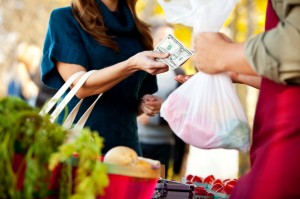Special Report: Midwest Farmers Markets Wine Regulations
 As more people seek their region’s local foods to purchase, more than 1,000 new farmers markets began operating across the country last year. As of mid-2011, 7,175 farmers markets were recorded, reports the U.S. Department of Agriculture. Considering that consumer interest in local foods has helped foster interest in regional wines, farmers markets and wineries would seem a natural coupling, but liquor distribution regulations and local restrictions can keep vintners out of farmers markets.
As more people seek their region’s local foods to purchase, more than 1,000 new farmers markets began operating across the country last year. As of mid-2011, 7,175 farmers markets were recorded, reports the U.S. Department of Agriculture. Considering that consumer interest in local foods has helped foster interest in regional wines, farmers markets and wineries would seem a natural coupling, but liquor distribution regulations and local restrictions can keep vintners out of farmers markets.
This Midwest Wine Press Special Report includes ten states and focuses on Illinois and Michigan where current regulations may be changing this year. The accompanying graphic presents a state-by-state overview of wine sales at farmers markets and public events. Missouri, a state that allows wine sales at farmers markets, presents the opportunity to explore reasons that winemakers sometimes refrain from participating in farmers markets.
Illinois:
Currently Illinois wineries must have a special event retailer’s liquor license (not-for-profit) to sell wine in the state’s farmers markets. The fee is $25 per application and cannot go over 15 days, and the application must be received 14 days in advance prior to scheduled event. However, the Illinois Grape Growers and Vintners Association would like to see changes made to this process by allowing wineries to have an annual permit that allows off-premise sales.
Legislation was filed Feb. 8, 2012, to create an Annual Winery Special Use Permit, which would pertain to festivals and farmers markets. Illinois House Bill HB5061 is sponsored by Rep. Brandon W. Phelps. The corresponding Illinois Senate Bill SB3456 is sponsored by Sen. Michael W. Frerichs.
An extended license would streamline the process and reduce paperwork for regulators, noted Megan Pressnall, director of external relations for IGGVA. Pressnall also explained that there has been confusion with the current wording of the special event retailer’s liquor license. ‘In the past, it has been interpreted to mean 15 consecutive days,” she said, ‘and last year it was interpreted as a total of 15 days, but not consecutive.”
Michigan
No laws or permits are in place currently for the sale of wine at Michigan farmers markets. Farmers market legislation has been proposed twice, once in 2009 and again in 2011. Senate Bill 32, introduced by Sen. Goeff Hansen during early 2011, proposed authorizing a special liquor license allowing Michigan winemakers (but not ones from other states) to sell wine and hold wine tastings at farmers markets and special events. The proposed license fee is $25 per day. Linda Jones, executive director of the Michigan Grape and Wine Industry Council, said that there is interest from wineries and from the Michigan Farmers Market Association to have this legislation pass.
Jones added that a report is expected soon that pertains to a recent review of the state’s liquor regulations. Under a mandate by Gov. Rick Snyder to review unnecessary rules and regulations, Michigan’s Office of Regulatory Reinvention formed the Liquor Control Advisory Rules Committee last year to offer recommendations regarding the manufacturing, distribution and sale of liquor and related licensing. The committee’s report is expected to be published in February, Jones said.
For more information regarding pending legislation visit: michiganvotes.org
Missouri
Missouri wineries can sell by the bottle, by the glass, and do wine tastings at farmers markets. To sell by the bottle, the winery must have a Missouri domestic wine license and hold a business permit for the city or area where the farmers market is located. To sell by the glass requires a caterer’s permit.
Jim Anderson, director of the Missouri Wine and Grape Board, said that many wineries prefer to sell by the bottle rather than the glass at farmers markets; sales by the glass are more typically for special events. Serving wine by the glass can subject wineries to more stringent sanitation requirements, not be mention tranport and cleaning costs. Anderson also noted that it is harder for smaller wineries to come to weekend farmers markets because many people visit wineries on weekends. Anderson said that a farmers market is more likely to attract wineries on a less busy day, such as Tuesday or Thursday. Also, some wineries have concluded that the reduced cost of goods sold resulting from tourist purchases at the winery outweighs the potential additional sales and exposure of farmers markets, Anderson opined.
Caroline Todd, director of the Columbia (Mo.) Farmers Market, mentioned that location can affect the number of wineries selling at farmers markets. For example, the Columbia Farmers Market requires most vendors to be from a 54-mile radius of the market. Winemakers also cite the cost of licensing and permit fees, and limited booth openings as additional reasons they may not become vendors at farmers markets.
To sell by the bottle, a winery must have a Missouri domestic wine license. To sell by the glass, a winery needs a caterer’s permit. The new amended State statute can be viewed at: moga.mo.gov
[ws_table id=”2″]


Great article . It again points out that Wisconsin is in the twentyth century when it comes to alcohol and allowing small mom and pop business as well as local products to surive. Keep up the good work.